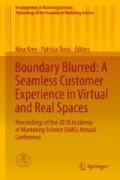Abstract
Ambivalence reflects the coexistence of positive and negative evaluations of an attitude object, and there is mixed evidence about its impact on consumer decision-making and behavior, with some studies showing ambivalent attitudes as weak and less predictive of behavior, whereas others find them to be more predictive of behavioral intentions. Prior research also does not empirically examine the relationships among ambivalence, indifference, and dissonance despite their similarities and differences with each other. We address these gaps with a conceptual framework based on an extensive review of consumer ambivalence literature and two experimental studies that explore the role of consumer ambivalence in consumer choice. Overall, our findings show that attitudinal and situational ambivalence do vary in their effects on consumer choice between hedonic and utilitarian options. We also show that consumer dissonance and indifference play important roles in this process. These findings extend current research on consumer ambivalence as well as on consumer choice by distinguishing between the roles of the two types of ambivalence and the roles of consumer dissonance and indifference on the choice between hedonic and utilitarian options. Besides these conceptual contributions, our findings also have important managerial implications for marketers of hedonic versus utilitarian products and services.
You have full access to this open access chapter, Download conference paper PDF
Similar content being viewed by others
Keywords
- Ambivalent Situation
- Consumer Choice
- Consumer Ambivalence
- Utilitarian Option
- Important Managerial Implications
These keywords were added by machine and not by the authors. This process is experimental and the keywords may be updated as the learning algorithm improves.
Ambivalence reflects the coexistence of positive and negative evaluations of an attitude object, and there is mixed evidence about its impact on consumer decision-making and behavior, with some studies showing ambivalent attitudes as weak and less predictive of behavior, whereas others find them to be more predictive of behavioral intentions. Prior research also does not empirically examine the relationships among ambivalence, indifference, and dissonance despite their similarities and differences with each other. We address these gaps with a conceptual framework based on an extensive review of consumer ambivalence literature and two experimental studies that explore the role of consumer ambivalence in consumer choice. Overall, our findings show that attitudinal and situational ambivalence do vary in their effects on consumer choice between hedonic and utilitarian options. We also show that consumer dissonance and indifference play important roles in this process. These findings extend current research on consumer ambivalence as well as on consumer choice by distinguishing between the roles of the two types of ambivalence and the roles of consumer dissonance and indifference on the choice between hedonic and utilitarian options. Besides these conceptual contributions, our findings also have important managerial implications for marketers of hedonic versus utilitarian products and services.
Author information
Authors and Affiliations
Corresponding author
Editor information
Editors and Affiliations
Rights and permissions
Copyright information
© 2018 Academy of Marketing Science
About this paper
Cite this paper
Sharma, P., Leo, C., Nagpal, A., Jiang, Y. (2018). Exploring the Role of Attitudinal vs. Situational Ambivalence in Consumer Choice: An Abstract. In: Krey, N., Rossi, P. (eds) Boundary Blurred: A Seamless Customer Experience in Virtual and Real Spaces. AMSAC 2018. Developments in Marketing Science: Proceedings of the Academy of Marketing Science. Springer, Cham. https://doi.org/10.1007/978-3-319-99181-8_192
Download citation
DOI: https://doi.org/10.1007/978-3-319-99181-8_192
Published:
Publisher Name: Springer, Cham
Print ISBN: 978-3-319-99180-1
Online ISBN: 978-3-319-99181-8
eBook Packages: Business and ManagementBusiness and Management (R0)




